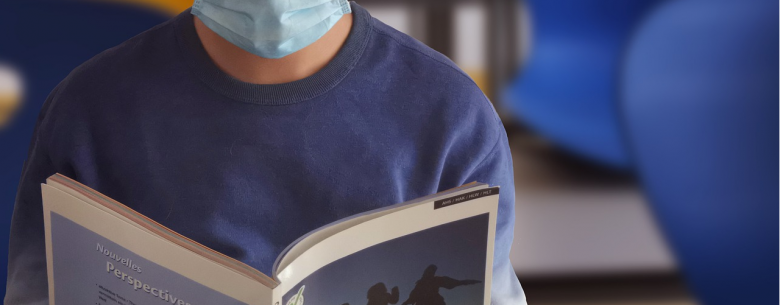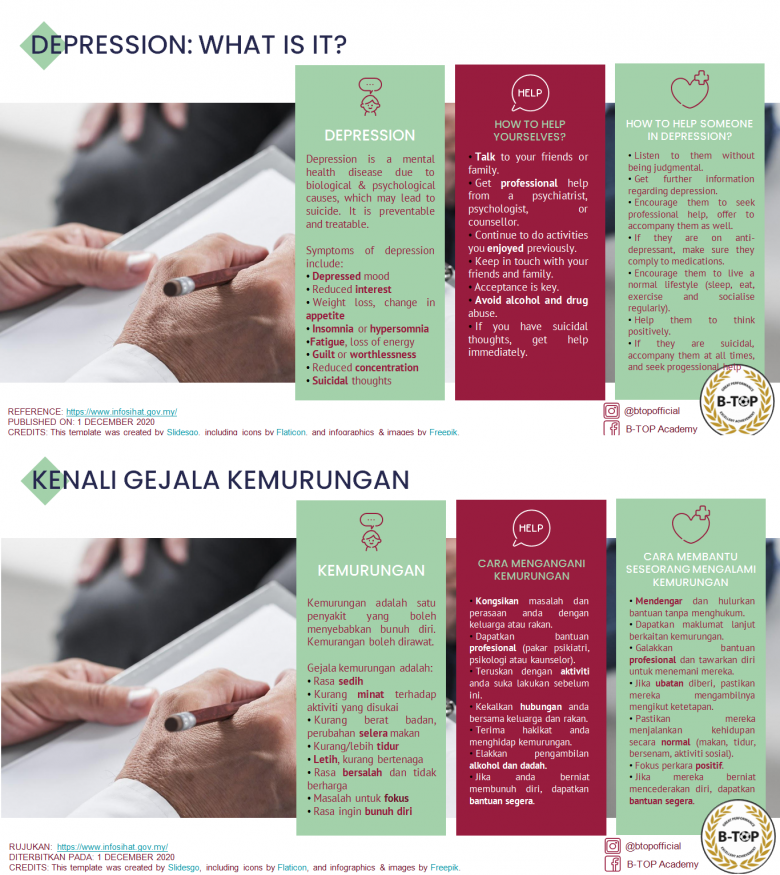TEENS AND COVID-19
COVID-19 has taken the world by storm and impacted the lives of people all over the world, including children and teenagers as well. In Malaysia, the Movement Control Order (MCO) was announced in 11th March 2020, implementing containment measures and closure of majority premises including educational institutions, religious buildings, entertainment and business industries.
91% of students were impacted from the closure of schools worldwide, causing disruption in their education, physical activities and opportunities for socialisation. Absence of structured setting of school for long duration result in disruption in routine, boredom and lack of innovative ideas. The sudden changes of previously structured lifestyle may impose stress and anxiety to them, and worsen by the fear of infection on oneself or family members, and separation from family members during quarantine. These effects may in turn have long term adverse consequences on their mental health status.
TRYING SOMETHING NEW
To counter these effects, it is important for you to be proactive and use your time well by doing beneficial activities. Here are some activities that you can start doing!
1. Learn a New Skill
With all the extra hours at home, you can definitely pick up a new skill or two. Think of a hobby or activity that you are interested about but have been put off for some time because you were busy with academics or other activities. This is the perfect time to pick up that spatula and try new recipes with your family, dust off the guitar and start playing some tunes, or get some art supplies and start your little art and DIY project. A trending activity nowadays is content creation, be it on YouTube, TikTok or Instagram and Facebook, the art of filming, photography and editing is not only fun, but also an excellent way to channel your idea and creativity. It may be difficult to learn a new skill at the beginning, but there are many free tutorial videos and websites available online to guide you. Language applications are also available to help you learn new language in a more interactive way.

2. Self-Enrichment Activities
Reading can be fun when you get to choose your preferred reading materials. Reading is the perfect way to fill your time and your mind as it can enrich your intellectual and spiritual resources. Examples of enrichment reading materials include self-help books, motivational and inspiring stories, and autobiographies. These books may open up your thinking and allow you to think deeper about yourselves and reflect on yourselves. Perhaps the stories you’ve read may inspire you in a way or help you sort out your future plans and career choices. The benefit of reading is limitless, and it is up to you to explore the possibilities.

3. Adopt New Lifestyle Structure
Initially, some may find the closure of schools is the perfect time for you to sleep late at night and wake up late in the afternoon. However, sooner or later you will find yourselves having poor sleep quality, physically uneasy due to pent-up energy, and anxious regarding your education. Therefore, it is vital for you to discipline yourselves and adopt a new lifestyle structure. Make a daily schedule consisting of sleep and wake time, time dedicated for studying and online classes, entertainment, hobby, and social activities. Make sure to include exercise and physical activities to stay active and healthy.

4. Home Improvement Projects
This is the perfect time to spend your time on home improvement projects with your parents. Help them out by cleaning up the house and discard junks that “do not spark joy”. You can also discuss with your parents to rearrange the furniture and plan out new layout, which will give you a breath of fresh air and give your home a brand new look without spending a penny. If you have budget to spare, you can decorate your bedroom and modify studying area to optimise your online studying experience. Another trending home improvement project during this pandemic is gardening. You can start small by planting herbs and veggies from kitchen scraps and seeds. For starter, plant onions, shallots, bok choy, tomatoes or chillies. This utilises kitchen scraps and reduce waste, and at the same time reduce the cost of groceries by producing your own crops. Some people may even claim that gardening is therapeutic and help calm them down.

5. Stay in Contact With Friends & Family
Human is a social being that relies on socialisation and communication, therefore the term “social distancing” is a misnomer, as the concept is not to cut down socialisation, but only to physically distance oneself from another to prevent the spread of COVID-19. The technologies available in this era has allowed us to communicate and socialise while maintaining physical distance effectively. Make sure to call your friends and family frequently to check up on them, and also to prevent yourselves from being lonely. Video calls and virtual meetings (via Zoom, Webex etc.) can be used to enhance your socialising experience. Nowadays, people also host online parties and game nights to keep the meeting lively and fun. The emerging of online games with interactive voice chats can also be used as a mean of socialisation and entertainment.

ON A SERIOUS NOTE
While boredom and stress may be manifested on the early stage, these may lead to serious repercussion on teens’ mental health in the long run. Limited opportunities for leaving home, cancelled social gatherings and events, isolation, loneliness, stress and anxiety may further lead to mental health disorders such as depression and anxiety.
Symptoms of depression include feeling down, loss of interest in doing activities you previously enjoyed, reduced/increased appetite, weight loss, reduced/increased sleep, tired, reduced concentration, feeling guilty and worthless, crying spells, and suicidal thoughts. Symptoms of anxiety, on the other hand, include feeling restless, easily fatigued, difficulty in concentration, irritable, muscle tension, and sleep disturbances. If you or any of your household members experience these symptoms, feel free to open up and seek help from adults, professional healthcare providers or counsellors. Mental health treatment are still considered as essential service during the pandemic, so don’t hesitate to contact your nearest healthcare facilities.

ABUSE AND NEGLECT
It is also worth to mention that domestic abuse is on the rise worldwide since the coronavirus pandemic. Talian Kasih, a governmental hotline under Ministry of Women, Family and Community Development Malaysia has reported a total of 159703 contacts since January to 14th November 2020. A drastic increase in domestic abuse is closely related to the worsening social inequality, causing the underprivileged children to be more susceptible to abuse and neglect. Poor families with no source of daily wages lead to frustration and helplessness, and the frustration is displaced to the weakest link – the kids.
If you are a victim of abuse, or suspect any abuse occurring among your neighbourhood, please contact Talian Kasih on 15999, or report directly to the authorities. You are not alone.
